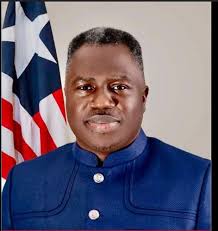In the modern era, the shift towards renewable energy has become a global imperative, transcending borders, and rewriting the rules of economic and environmental policy-making. During the Energy Forum (AEF) on June 27, 2024, in Barcelona, Spain, the Honorable Jeremiah Kpan Koung, Vice President of Liberia, made a compelling and strategic call for the advancement of renewable energy projects across the African continent.

One of the fundamental arguments supporting the Vice President’s call lies in the economic sphere. Advancements in renewable energy technology have shown a consistent decrease in costs, making them more financially accessible to developing economies. As such, Africa’s rich renewable resources, including hydro, solar, and wind, present an opportunity for sustainable economic growth. The adoption of renewable energy infrastructure would increase energy availability, reduce the continent’s reliance on imported fossil fuels, and stimulate local industries. Further, widespread renewable projects have the potential to create a swell of job opportunities, positively affecting unemployment rates.
Renewable energy sources also carry paramount environmental and health advantages. These clean energy sources emit little to no greenhouse gases or air pollutants during their operation, a sharp contrast to the detrimental effects of burning fossil fuels. Additionally, investing in renewables aligns directly with the Sustainable Development Goals (SDGs), particularly the imperative to “ensure access to affordable, reliable, sustainable, and modern energy for all” (United Nations Development Programme, 2024; https://undp.org). By reducing the carbon footprint and mitigating the impacts of climate change, Liberia, and indeed all African nations, can foster a healthier, more sustainable environment for future generations.
Energy Security and Independence:
Vice President Koung’s advocacy for green energy initiatives also highlights a critical issue facing many African countries: energy security. Africa’s reliance on imported fossil fuels subjects its economies to global price volatility and supply disruptions, a scenario seen during the energy crises of the early 21st century (African Development Bank Group, 2023; https://www.afdb.org). Renewable energy, derived from local and inexhaustible sources, offers a more secure and stable energy supply. By investing in indigenous renewable resources, African nations can safeguard against external economic pressures and build energy autonomy, an essential foundation for any sovereign nation.
On a geopolitical level, the transition to renewable energy presents Africa with the opportunity to redefine its strategic significance on the global stage. As developed nations seek to meet their climate targets, they will increasingly look to partners who are taking bold steps towards green energy. Africa’s commitment to renewable projects can enhance its bargaining power in international relations, climate negotiations, and trade deals, opening doors to new investments and diplomatic partnerships.
Social and Developmental Impact:
Lastly, a consideration that cannot be overstated is the social upliftment that renewable energy can foster across the continent. Access to clean, reliable, and affordable energy has been identified as a catalyst for improving quality of life, alleviating poverty, and promoting gender equality by freeing women and children from the arduous tasks of fuel collection and exposure to harmful indoor air pollution. Through localised energy solutions, rural areas, which often remain in the dark due to the lack of grid infrastructure, could leapfrog into a new era of connectivity and productivity.
Vice President Jeremiah Kpan Koung’s call for the advancement of renewable energy projects in Africa is a visionary step toward reshaping the continent’s energy landscape. Economic considerations, environmental imperatives, energy security, geopolitical benefits, and social impacts underscore the complex advantages of this transformation. As Africa stands on the brink of an energy revolution, it must seize the moment to embrace this sustainable path for the prosperity of its people and the planet. The arguments outlined herein not only support the Vice President’s proposal but also highlight the need for immediate and collective action to harness the immense potential of Africa’s renewable resources.
Written by Emmanuel Huleji Daudu
Editor-In-Chief, Africa Security Investigation News,
Global Founder,
World Sustainable Development Goals Organization

